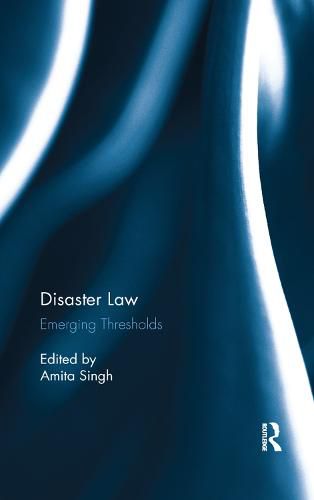Readings Newsletter
Become a Readings Member to make your shopping experience even easier.
Sign in or sign up for free!
You’re not far away from qualifying for FREE standard shipping within Australia
You’ve qualified for FREE standard shipping within Australia
The cart is loading…






This book looks at how legal frameworks can and do reduce risks arising out of disasters. The volume:
analyses existing disaster laws and the challenges on the ground;
brings together case studies from some of the most vulnerable regions; and
proposes solutions to avert existing and possible future crises.
The book offers appropriate legal frameworks for disaster management which could not only offer sustainable institutional reforms towards community resilience and preparedness but also reduce risk within the frameworks of justice, equity and accountability. It examines the intricacies of governance within which governments function and discusses how recent trends in infrastructure development and engineering technology could be balanced within the legal principles of ethics, transparency and integrity. The chapters in the volume suggest that legal frameworks ought to resonate with new challenges of resource management and climate change. Further, these frameworks could help secure citizens’ trust, institutional accountability and effective implementation through an unceasing partnership which keeps the community better prepared and more resilient.
This volume will be indispensable to scholars and researchers of disaster management, law, public policy, environment and development studies as well as policymakers and those in administrative, governmental, judicial and development sectors.
$9.00 standard shipping within Australia
FREE standard shipping within Australia for orders over $100.00
Express & International shipping calculated at checkout
Stock availability can be subject to change without notice. We recommend calling the shop or contacting our online team to check availability of low stock items. Please see our Shopping Online page for more details.
This book looks at how legal frameworks can and do reduce risks arising out of disasters. The volume:
analyses existing disaster laws and the challenges on the ground;
brings together case studies from some of the most vulnerable regions; and
proposes solutions to avert existing and possible future crises.
The book offers appropriate legal frameworks for disaster management which could not only offer sustainable institutional reforms towards community resilience and preparedness but also reduce risk within the frameworks of justice, equity and accountability. It examines the intricacies of governance within which governments function and discusses how recent trends in infrastructure development and engineering technology could be balanced within the legal principles of ethics, transparency and integrity. The chapters in the volume suggest that legal frameworks ought to resonate with new challenges of resource management and climate change. Further, these frameworks could help secure citizens’ trust, institutional accountability and effective implementation through an unceasing partnership which keeps the community better prepared and more resilient.
This volume will be indispensable to scholars and researchers of disaster management, law, public policy, environment and development studies as well as policymakers and those in administrative, governmental, judicial and development sectors.